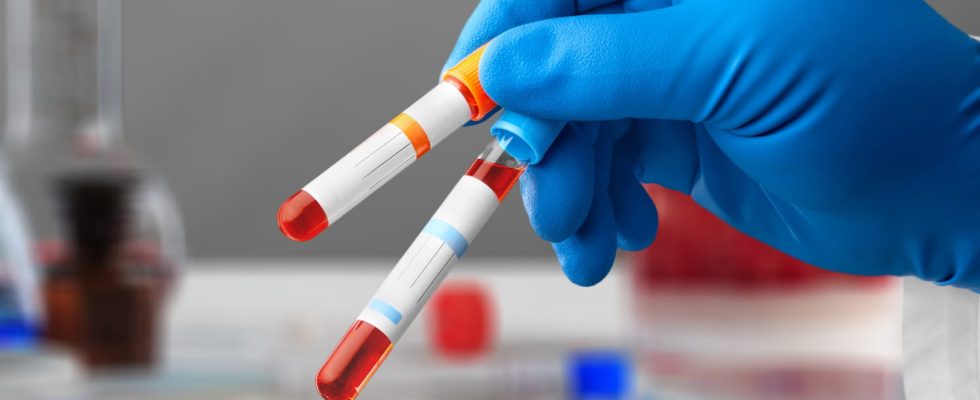Anti-TSH receptor antibodies are produced by the immune system that target TSH receptors on the surface of thyroid cells. They are detected by a specific blood test that measures their level in the blood. A positive result may be associated with hyperthyroidism or autoimmune thyroid disease.
What are anti-TSH receptor antibodies?
“Anti-TSH receptor antibodies (“TSH receptor antibodies” or TRAC or TRAK) are antibodies produced by the immune system and directed against thyroid stimulating hormone (TSH) receptors located on the surface of thyreocytes, i.e. the cells of the thyroid gland“, explains Dr. Emmanuel Bories, Medical Biologist. These antibodies can bind to TSH receptors and stimulate them inappropriately, which can lead to excessive production of thyroid hormones, thus causing hyperthyroidism. “This is the origin of Graves’ disease, which is the most common cause of hyperthyroidism. Less commonly, they can also block these receptors and thus create a hypothyroidism“. Hyperthyroidism can cause various symptoms such as weight loss, fatigue, irritability, tremors, rapid heart rate and sleep problems. “Measurement of anti-TSH receptor antibodies is often used to help diagnose Graves’ disease and to monitor disease progression and treatment effectiveness. TRAK antibody levels can also help predict the likelihood of relapse after treatment“.
What is the normal level of anti-TSH receptor antibodies?
“The normal level of anti-TSH receptor antibodies, also called TRAK (TSH Rezeptor-Antikorper or TRAC for TSH receptor antibodies) can vary by lab and measurement method used, continues our interlocutor. In general, a TRAK rate less than 1.5 IU/L is considered normal in adults“. However, the presence of anti-TSH receptor antibodies does not necessarily mean that you have thyroid disease. “TRAK antibody levels can be elevated in people with autoimmune thyroid disease, such as Graves’ disease, but can also be elevated in people without thyroid disease“.
Positive anti-TSH receptor antibodies: why?
A positive anti-TSH receptor antibody test indicates the presence of antibodies against TSH receptors on the surface of thyroid cells. “A positive TRAK test may be the sign of an autoimmune thyroid disease, such as Graves’ disease, which is the most common cause of hyperthyroidism“, resumes the biologist. In this disease, the immune system produces antibodies which excessively stimulate the TSH receptors, leading to excessive production of thyroid hormones. “However, a positive TRAK test may also be present in people with other autoimmune diseases, such as rheumatoid arthritis or systemic lupus erythematosusor in people with other thyroid disorders, such as hypothyroidism or thyroiditis“.
Negative anti-TSH receptor antibodies: why?
A negative TSH receptor antibody test indicates that antibodies to TSH receptors on the surface of thyroid cells are absent or in very small quantities. “However, the absence of TRAK does not necessarily mean that you do not have thyroid disease, assures the specialist. TRAK tests are specific for Graves’ disease, but there are other thyroid diseases that can cause hyperthyroidism or hypothyroidism without showing TRAK.”
Positive anti-TSH receptor antibodies and pregnancy
A positive anti-TSH receptor antibody test in a pregnant woman may indicate the presence of Graves’ disease or another autoimmune thyroid disease. “If a pregnant woman has untreated Graves’ disease, it can increase the risk of complications for her and her baby, alert the biologist. Anti-TSH receptor antibodies can cross the placenta and affect the fetal thyroid gland“. An increase in the production of thyroid hormones due to excessive stimulation of the TSH receptors can lead to hyperthyroidism in the fetus, which can affect its growth and its development. “Pregnant women with Graves’ disease may also have an increased risk of miscarriagepreterm labor, preeclampsia and other complications“. It is important that pregnant women with positive anti-TSH receptor antibodies be regularly monitored by a doctor to monitor their thyroid function and treat any underlying thyroid disease if necessary. Treatment may involve antithyroid drugs to control hyperthyroidism, or thyroid hormones to treat hypothyroidism. “Pregnant women with Graves’ disease should be cared for by a physician specializing in obstetrics and endocrinology to monitor their health and that of their baby throughout pregnancy.”
Anti-TSH receptor antibodies and Graves’ disease
Graves’ disease is a autoimmune thyroid disease which is characterized by excessive production of thyroid hormones. “This excessive production is due to the presence of anti-TSH receptor antibodies, also called TRAK, which stimulate the TSH receptors on the surface of thyroid cells.says Dr. Bories. This excessive stimulation leads to excessive production of thyroid hormoneswhich can cause symptoms such as weight loss, nervousness, excessive sweating, heart palpitations and irritability“. The TSH receptor antibody assay is used to diagnose Graves’ disease. A positive TRAK result indicates that antibodies to TSH receptors are present in high amounts in the blood, which is characteristic of Graves’ disease. “Treatment of Graves’ disease may involve antithyroid drugs to reduce the production of thyroid hormones, beta-blockers to reduce symptoms such as heart palpitations and irritability, or surgical removal of the thyroid in case of persistent or recurrent symptoms. In some cases, treatment may also include the use of radioactive iodine to destroy the thyroid glandPeople with Graves’ disease have an increased risk of having other autoimmune diseases, such as type 1 diabetes or Crohn’s disease, and may require additional monitoring and care for these conditions. .
Thanks to Doctor Emmanuel Bories, Co-responsible Medical Biologist at the Bio-Val Laboratory in Cruseilles (74) and member of the Les Biologistes Indépendants network.
